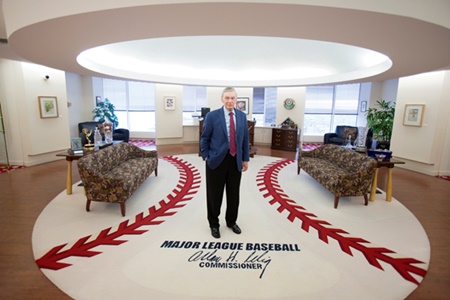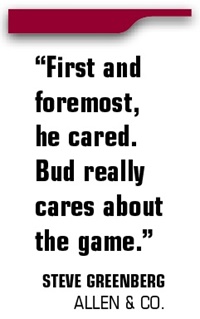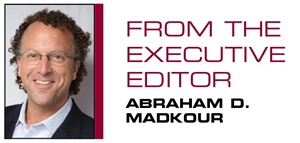Bud Selig was the perfect commissioner at the perfect time in baseball history. I can’t think of anyone else who could have steered the league to the success it has reached under his watch. He excelled at bringing stability and institutional change to the sport and focused his efforts internally rather than trying to win over the public with a commanding or charismatic style.
“People underestimate Bud,” former Blue Jays President and CEO Paul Godfrey told me recently. “Bud doesn’t shine on television. Roger Goodell does much better on television, except for the Ray Rice situation. When you saw Paul Tagliabue on television, he looked like a boss, like a commissioner. Bud’s hair is always in his eyes, he’s always pushing it back. It’s all optics and imaging. Bud didn’t have that. Bud made it up in action.”
Selig didn’t fare as well as his contemporaries when it came to on-camera presence and public comportment. He didn’t have the cerebral, commanding manner of Tagliabue or the personality and vision of David Stern. He never got the respect he deserved until these later years of his tenure. While that may have hurt the league when it came to public opinion, Selig’s other attributes saved the sport from instability and its broken economic system. More than any other commissioner I can recall, Selig woke up every morning with one thought: where MLB’s owners stood on the important issues.
He once said, “If you’re going to change the system, you have to understand the people.” He certainly understood the people. He was one of them, and he cared about them and the game.
 |
Bud Selig retires as MLB commissioner on Saturday.
Photo by: SCOTT PAULUS
|
Allen & Co.’s
Steve Greenberg remembers Selig’s rise to commissioner as he viewed it from his position as MLB’s deputy commissioner from 1990-93. Greenberg was brought to MLB by
Fay Vincent, who was removed from his post in 1992 by owners, led in part by Selig.
“Bud was always influential, for all the right reasons,” Greenberg told me. “First and foremost, he cared. Bud really cares about the game. There’s no owner or commissioner, perhaps ever, who’s had a better sense of the history of the game, a history of how we got where we are, a history of how ownership and leagues interact. He really, really cared.”
Selig combined his care and love of the game with unique political savvy, likened to the late Tip O’Neill in using influence and acumen to pass policy. Selig used a one-to-one approach of working the phones like a congressional House leader searching for votes. He was persistent — almost relentless — as he sought more information from each and every owner.
“He knew where all the votes were,” Godfrey said. “He is the best politician I’ve seen in the role of commissioner. He knows where everybody is. If he thinks you’re going to go offside before a meeting, he’ll call you. If you went offside during a meeting, he’ll pull you out and say, ‘What did you do?’”
Selig understood that information translated to influence, leverage and power to get what he needed, helping him make a business trade here or a deal there. “He was always very interested in what you had to say,” Godfrey recalled. “He’d work the phones and he knew how to do favors. He knew if you really needed him. If you leaned on him, he’d say, ‘OK, I’m going to do this for you.’ He didn’t ask for anything in return, but he made you feel that you were the one, and you owed him one.” Those IOUs added up and allowed Selig to get what he needed.
 |
Where some commissioners — Stern comes to mind — were deeply engaged in virtually every league issue from competition to legal to marketing and media, Selig was more removed. He didn’t get involved in the details. He sat at 10,000 feet, realizing his primary job was managing ownership. To him, it was all about his 30 bosses and managing that maze. One could surmise that he would start each day by counting where ownership was on certain issues before moving on to the previous night’s box scores.
One of Selig’s great strengths, or tactics, was his ability to wait people out. Time and again, Selig would be criticized for delaying, or demonstrating an inability to make a decision. It may have been over the Expos relocation, the Giants/A’s territorial dispute, or the MASN case. So many issues seemed to demand a resolution, but Selig’s genius was to recognize that nothing needed to be resolved by a certain time. He would eventually wear people down. He told SportsBusiness Journal in 2006, “I believe patience has stood me in great stead throughout my career. Take your time, be thoughtful and deliberate.” You could call it being thoughtful or a tactic, but he understood that a resolution would eventually come. While some commissioners would feel the need to be ultra-aggressive in decision-making, Selig was passive aggressive, making people wait in what turned out to be an enormously effective strategy.
But waiting didn’t always work. Use of performance-enhancing drugs increased in the mid-1990s and early 2000s, and waiting on that was a flawed strategy. “Whether he turned a blind eye or wasn’t aware it was as dramatic as it was, we don’t know,” Godfrey said. Selig’s patient, wait-it-out strategy is one we may never see again among major sports commissioners.
While Selig failed to win much respect outside of baseball — as recently as 2006 he was named the least effective commissioner by SportsBusiness Journal/Daily readers — he certainly engendered loyalty among his staff. Over the years, MLB staffers stressed to me how people underestimated Selig’s leadership. They raved about his management and professed their deep trust in him. They’d go to the wall for him. Much of that was in the way he managed; he let his management team have a long rope and run. But he also wasn’t afraid of a competitive management environment that kept different division heads battling each other. Just look at the way MLB Advanced Media operated outside of the league’s Park Avenue headquarters.
Like many leaders in sports business, Selig was thin-skinned, becoming irate over a column or coverage of the sport’s ratings or popularity. I still remember Selig’s gripes over critics like Mike Lupica and Bob Costas. Selig constantly harped that the media held baseball to a different standard on issues like PEDs compared to how other leagues were assessed, especially the NFL.
SportsBusiness Daily launched during the players strike of ’94 and the cancellation of the World Series. Looking back, I don’t think I could have imagined Selig’s tenure playing out the way it has from those dark days. He grew into the job. He knew and cared about the sport, and he was committed to fix it. He leaned on owners, engaged the players union, built consensus, and made dramatic changes. He leaves the game far more stable and healthy.
“There’s only been one former owner in the history of sports who has become commissioner, and that’s Bud. He’s such a unique person and figure,” Greenberg said. “He loved the Brewers, loved running them day to day. But it was the perfect decision for the owners to make. He was the only person who could navigate those contentious issues that existed in the 1990s and get the result that the game got. I don’t think any outsider could’ve pulled it off. They would not have had the credibility. When I saw big-market teams pound tables about revenue issues and say, ‘You’re trying to get in my pocket. I’m not going to go for this revenue sharing; that’s my money!’ I was like, ‘Wow, how are you going to get this done?’ Now look at what’s accomplished.”
Bud Selig. The right man at the right time.
Abraham D. Madkour can be reached at amadkour@sportsbusinessjournal.com.






